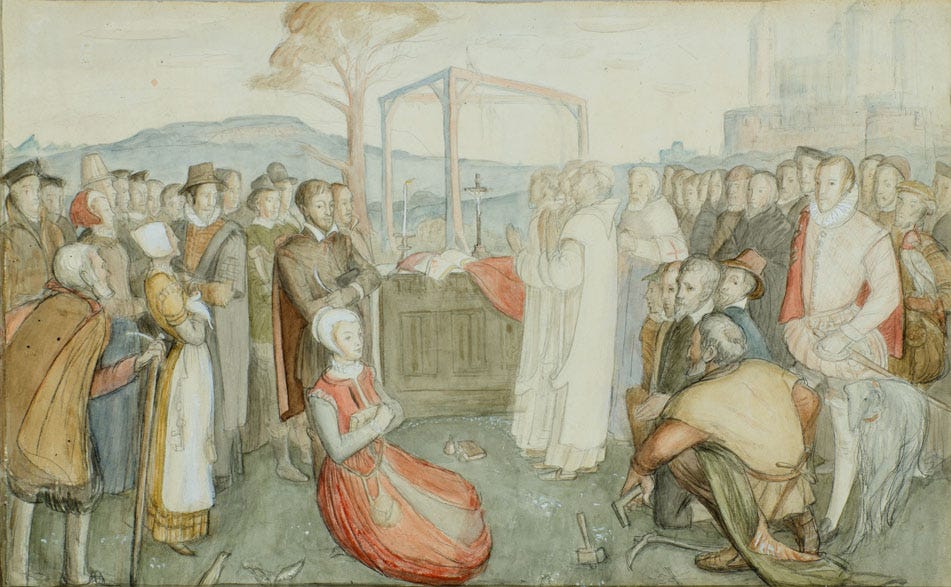Continuing our series of brief summaries of Shakespeare’s plays, understanding the message he meant for Catholic audiences, here is the summary of Romeo & Juliet.
Juliet is the Son
Among the most recognized love stories ever told is the story of a priest’s love for Catholics in tyrannical England. To this day, the word Romeo is an almost-synonym for “lover.” And this is because of Shakespeare’s preeminent love story of two “star-crossed lovers.”
But, in Shakespeare’s day, Romeo meant “pilgrim of Rome.” In other words — a Catholic. Yes, Shakespeare’s famous love story is about a Catholic priest pursuing his beloved in a time when to love the Church was illegal.
“O Romeo, Romeo, wherefore art thou Romeo?”
And yes, another often utilized literary trope in English literature is the identify the Christ-figure by the initials J.C., and Shakespeare’s genius was to disguise the Christ-figure in the form of a love-struck teenage girl. But this disguise is plain as day, for Romeo sees Juliet and proclaims, “What light through yonder window breaks? It is the East, and Juliet is the Sun.”
Or, as Catholic audiences hear — Juliet is the Son.
In the beginning of Protestant England, these star-crossed lovers are doomed from the start because their families are representative of the two great houses at war with each other in English culture, the Royal house (the Capulets) and the Papal house (the Montagues).
The hope of the great love story was that in the death of these lovers reconciliation would be achieved. In other words, in the martyrdom of Catholic priests and people, the warring houses would reconcile and find peace.
But if the State doesn’t reconcile with the Church, the moral of this Catholic tale is that without a Romeo to bring the sacraments to God’s people, the body of Christ is no longer present. Once Romeo perishes, his beloved no longer lives. With this allegorical understanding of Shakespeare’s intentions for his great love story, there is so much more meaning to Catholic audiences in the many love-struck lines found throughout the play. Romeo & Juliet is not simply a love story, but in the hands of the masterful Shakespeare, the story is also history, prophecy, and a warning of the evils of tyranny. And yes, the greatest romance told in England during tyrannical times was one that honored the many martyred Catholic priests.
Two households, both like in dignity, in fair Verona, where we lay our scene, from ancient grudge to new mutiny, where civil blood makes civil hands unclean. from forth the fatal loins of these two foes a pair of star-crossed lovers take their life, whose misadventured piteous overthrows doth with their death bury their parents strife. the fearful passage of their death-marked love, and the continuance of their parents’ rage, which, but their children’s end, naught could remove, is now the two hours’ traffic of our stage, the which if you with patient ears attend, what here shall miss, our toil shall strive to mend.





But there's so many dick jokes in it...
There's a lot more comedic characters and double entendres in Romeo and Juliet than in Shakespeare's other tragedies; I've honestly always wondered if it were meant to be a dark comedy.
Sorry but I don't see how this is a Catholic story. As a young lady, I really liked this play. However, in the last few years, I find these types of stories harmful to young people. It fills their heads with nonsense and encourages rash behavior.
The two lovers marry in secret, (against their parents wishes,) which goes against Church teaching. No one is permitted to marry in secret.
When things don't work out, they suicide, which breaks the commandments of God.
In the play, the priest and Romeo's friends describe him as a boy who lusts after one girl and then by evening he's madly in love with Juliet. His love is in his eyes. He's a bunch of uncontrolled passions and emotions.
I have never read the interpretation of this play in the way you have presented it. So, I'm surprised at this attempt to make it appear Catholic. Moreover, the numerous movies made with this play, display a lot of nudity and kissing, if anything, this play makes a mockery of being Catholic.